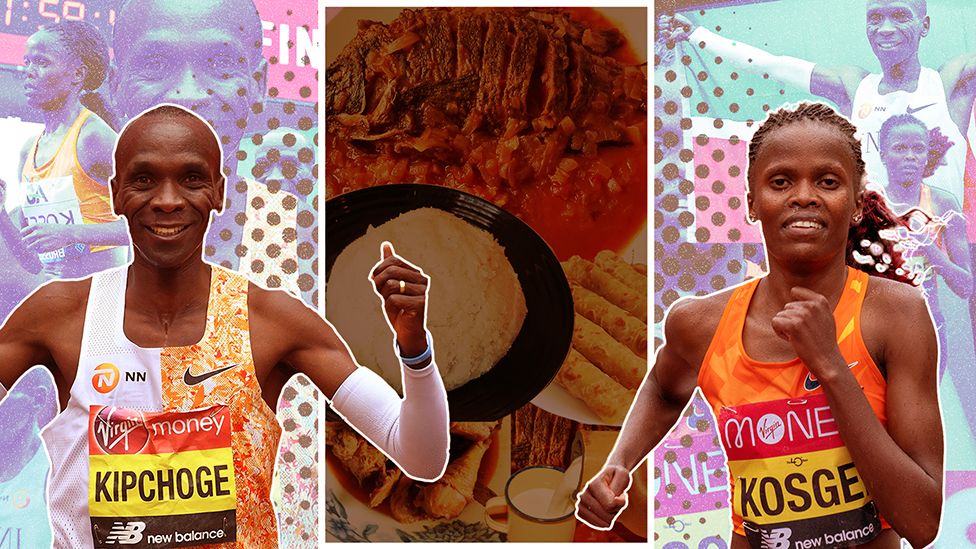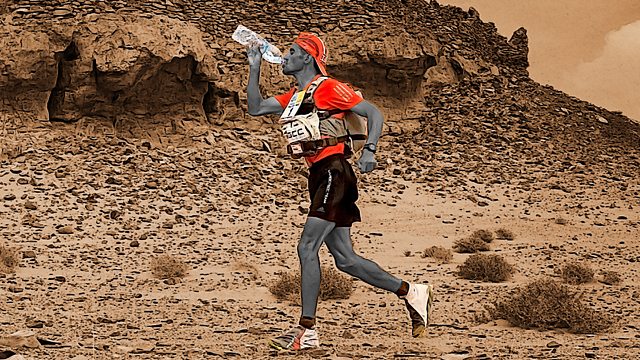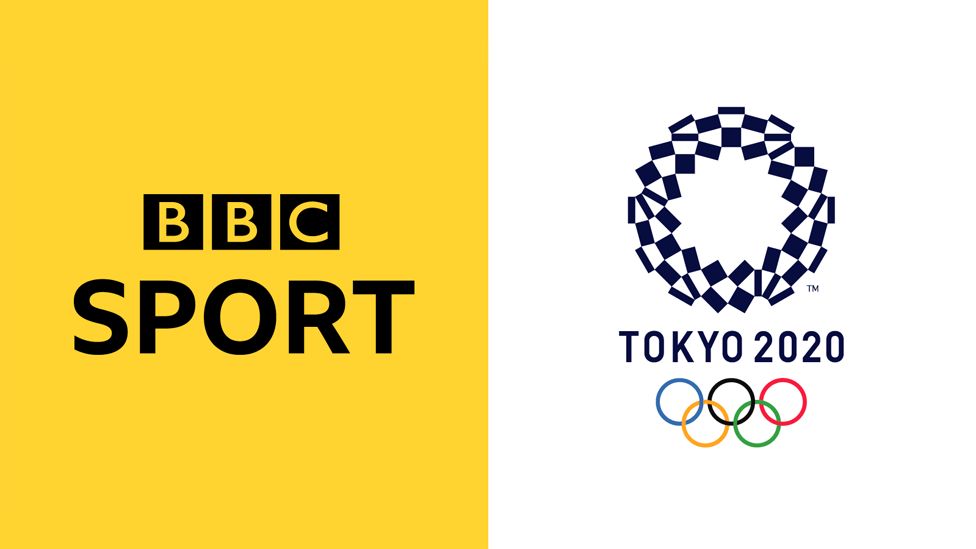Simple, natural, no fuss: The Food that fuels Olympic marathon champions
The marathon is almost synonymous with the Olympics and has been part of the modern Games since their beginnings in 1896. Running 42.2 kilometres at speed is one of the ultimate endurance events, requiring athletes to burn up huge amounts of energy.
But how much exactly? And in an era of advanced sports science and nutrition, what are the foods that fuel the champions?
Let's find out from two of the best, the current marathon record holders for men and women, Eliud Kipchoge and Brigid Kosgei, who both hail from Kenya.
We've been to meet them as they trained for the Tokyo Games and spied on their eating habits.
Scroll through this story and tap on highlighted keywords to discover some of the energy-rich food and drinks that will get Brigid and Eliud over the finish line!
1 cup of tea (with 3 teaspoons of sugar) = 90 kcal
A marathon is sweaty work, so let's start with some drinks. And this being Kenya, tea is the obvious choice. Adding some sugar should give our runners the fuel to get out of the starting blocks.
Sweet is a favourite of many Kenyan runners. One study found that sugar accounts for a fifth of carbohydrates in their diet.
Amazingly, some runners drink more tea than water in training! Let's kick off the race with five cups, the equivalent of 450 kcal.
5 cups of tea = 450 kcal
Fifteen teaspoons may be a lot of sugar, but there's still a long way to go.
Time to give our athletes some proper food.
1 serving of ugali = 220 kcal
A good first choice is , a staple of East African cuisine made from maize flour and cooked like porridge.
It may be a humble dish, but ugali holds the key to Kenyan long distance runners' energy supply, providing almost a quarter of total calorie intake.
In Tokyo they will have to improvise. Brigid says: "In other countries there is no ugali like we use in Kenya. Maybe we eat rice, spaghetti, or chicken and fish there."
But let's stick to the diet of choice, and as one serving won't be enough, let's add two.
2 servings of ugali = 440 kcal
Ugali is good, but we are still a long way off our energy intake target.
Of course you can't just have porridge by itself, so let's see what else we can add to the menu.
1 serving of beef = 190 kcal
Meat will certainly help, but we are only just getting into our stride now.
And while beef can be a good source of protein, many elite Kenyan runners get theirs from milk and beans. So let's add some of those to the mix.
2 cups of milk = 320 kcal
Milk is an essential part of , the Kenyan sweet, white tea, flavoured with ginger and spices. So we add two cups to our athletes' intake. That's about 320 kcal.
Eliud is also fond of another local favourite: "Mursik! It's fermented milk. It's important as far as sports is concerned. If you take it, it will speed up the digestion. It will make digestion very fast", he says.
1 serving of kidney beans = 120 kcal
As for beans, one serving of cooked kidney beans goes well with the ugali and also boosts our calorie count by another 120 kcal for one portion. Unbelievably, we're still short! Bring on the potatoes!
Elite Kenyan runners also eat plenty of rice, potatoes and bread. Roughtly a quarter of the much needed calories and nearly a third of carbs come from this mix of basic staple foods. Ideal then to energise our marathon champions as they clock up the miles.
2 servings of rice and 1 serving of boiled sweet potatoes = 510 kcal
So let's see where we get to with two servings of rice and a single serving of boiled sweet potatoes.
Would that provide enough energy for our female champion to complete the marathon? Yes!
Finish line for Brigid Kosgei!
Brigid used approximately 1,666 kcal when she won the 2019 Chicago marathon.
To put that in context: She burned up almost the entire recommended daily intake for an average adult woman, in just 2 hours and 14 minutes!
Now, let's rewind and go back to Eliud Kipchoge. He is heavier and runs a little faster than Brigid, so he needs a bit more energy than her to make the final straight.
Let's cheer him along and spice up the plain staple foods with some fried eggs, cabbage, and some local leafy greens.
2 boiled eggs, 1 serving of managu, 1 serving of sukuma and 1 serving of boiled cabbage = 260 kcal
Now we're getting somewhere. With two eggs and a mix of vegetables we've gained Eliud another 260 kcal.
The interesting ingredients here are the locally sourced greens, starting with the spinach-like , mixed with sage and other spices.
There is also which is similar to kale and abundant in East Africa.
"We don't buy vegetables from the supermarket. The things that we usually grow in this place are cabbage and spinach. Because our land is fertile, we are not using chemicals," Brigid told the BBC.
We're almost there! Perhaps all we need now is a snack to push us over the finish line.
1 Banana = 100 kcal
Like everyone else, even elite runners like a snack. Popular local choices are fruit.
"Me, especially me, I like different types of fruits as snacks", Brigid says. "Maybe it's banana today, tomorrow it's a little watermelon, next day it's orange, next day it's mango."
She also confesses to be fond of the odd soft drink!
But for now let's stay on the healthy side, and try a banana which weights in at 100 kcal.
Finish line for Eliud Kipchoge!
The stadium erupts! We've finally reached a calorie count of 2,322 kcal, the total energy Eliud burned when he set a new world record in 2018.
And incredibly he used up almost the entire daily recommended calorie intake for an average adult male of 2,500 kcal - all in just 2 hours, 1 minute and 39 seconds.
Check out to see how he packs all those carbs and calories in!
Food for thought
Both Eliud Kipchoge and Brigid Kosgei are competing in Tokyo 2020 on the biggest stage.
Athletes from East Africa have dominated the Olympic marathon in recent years. Factors like their body build and the high altitude training in the Rift Valley region are likely to contribute to their success, along with their diet.
As Eliud told us, a good, balanced diet is key: "Athletics is like working in a construction company: You're working with your hands, mixing cement and everything. So what I mean is, what you eat is really crucial as far as energy spread is concerned."
In a world where elite sports rely on the latest food science and targeted nutritional products, it's worth remembering that some of the top performers are fuelled by simple, natural foods: No fuss!

1 cup of tea (with 3 teaspoons of sugar) = 90 kcal
A marathon is sweaty work, so let's start with some drinks. And this being Kenya, tea is the obvious choice. Adding some sugar should give our runners the fuel to get out of the starting blocks.
Sweet is a favourite of many Kenyan runners. One study found that sugar accounts for a fifth of carbohydrates in their diet.
Amazingly, some runners drink more tea than water in training! Let's kick off the race with five cups, the equivalent of 450 kcal.





5 cups of tea = 450 kcal
Fifteen teaspoons may be a lot of sugar, but there's still a long way to go.
Time to give our athletes some proper food.

1 serving of ugali = 220 kcal
A good first choice is , a staple of East African cuisine made from maize flour and cooked like porridge.
It may be a humble dish, but ugali holds the key to Kenyan long distance runners' energy supply, providing almost a quarter of total calorie intake.
In Tokyo they will have to improvise. Brigid says: "In other countries there is no ugali like we use in Kenya. Maybe we eat rice, spaghetti, or chicken and fish there."
But let's stick to the diet of choice, and as one serving won't be enough, let's add two.


2 servings of ugali = 440 kcal
Ugali is good, but we are still a long way off our energy intake target.
Of course you can't just have porridge by itself, so let's see what else we can add to the menu.

1 serving of beef = 190 kcal
Meat will certainly help, but we are only just getting into our stride now.
And while beef can be a good source of protein, many elite Kenyan runners get theirs from milk and beans. So let's add some of those to the mix.

2 cups of milk = 320 kcal
Milk is an essential part of , the Kenyan sweet, white tea, flavoured with ginger and spices. So we add two cups to our athletes' intake. That's about 320 kcal.
Eliud is also fond of another local favourite: "Mursik! It's fermented milk. It's important as far as sports is concerned. If you take it, it will speed up the digestion. It will make digestion very fast", he says.

1 serving of kidney beans = 120 kcal
As for beans, one serving of cooked kidney beans goes well with the ugali and also boosts our calorie count by another 120 kcal for one portion. Unbelievably, we're still short! Bring on the potatoes!
Elite Kenyan runners also eat plenty of rice, potatoes and bread. Roughtly a quarter of the much needed calories and nearly a third of carbs come from this mix of basic staple foods. Ideal then to energise our marathon champions as they clock up the miles.



2 servings of rice and 1 serving of boiled sweet potatoes = 510 kcal
So let's see where we get to with two servings of rice and a single serving of boiled sweet potatoes.
Would that provide enough energy for our female champion to complete the marathon? Yes!

Finish line for Brigid Kosgei!
Brigid used approximately 1,666 kcal when she won the 2019 Chicago marathon.
To put that in context: She burned up almost the entire recommended daily intake for an average adult woman, in just 2 hours and 14 minutes!
Now, let's rewind and go back to Eliud Kipchoge. He is heavier and runs a little faster than Brigid, so he needs a bit more energy than her to make the final straight.
Let's cheer him along and spice up the plain staple foods with some fried eggs, cabbage, and some local leafy greens.




2 boiled eggs, 1 serving of managu, 1 serving of sukuma and 1 serving of boiled cabbage = 260 kcal
Now we're getting somewhere. With two eggs and a mix of vegetables we've gained Eliud another 260 kcal.
The interesting ingredients here are the locally sourced greens, starting with the spinach-like , mixed with sage and other spices.
There is also which is similar to kale and abundant in East Africa.
"We don't buy vegetables from the supermarket. The things that we usually grow in this place are cabbage and spinach. Because our land is fertile, we are not using chemicals," Brigid told the BBC.
We're almost there! Perhaps all we need now is a snack to push us over the finish line.

1 Banana = 100 kcal
Like everyone else, even elite runners like a snack. Popular local choices are fruit.
"Me, especially me, I like different types of fruits as snacks", Brigid says. "Maybe it's banana today, tomorrow it's a little watermelon, next day it's orange, next day it's mango."
She also confesses to be fond of the odd soft drink!
But for now let's stay on the healthy side, and try a banana which weights in at 100 kcal.

Finish line for Eliud Kipchoge!
The stadium erupts! We've finally reached a calorie count of 2,322 kcal, the total energy Eliud burned when he set a new world record in 2018.
And incredibly he used up almost the entire daily recommended calorie intake for an average adult male of 2,500 kcal - all in just 2 hours, 1 minute and 39 seconds.
Check out to see how he packs all those carbs and calories in!






Food for thought
Both Eliud Kipchoge and Brigid Kosgei are competing in Tokyo 2020 on the biggest stage.
Athletes from East Africa have dominated the Olympic marathon in recent years. Factors like their body build and the high altitude training in the Rift Valley region are likely to contribute to their success, along with their diet.
As Eliud told us, a good, balanced diet is key: "Athletics is like working in a construction company: You're working with your hands, mixing cement and everything. So what I mean is, what you eat is really crucial as far as energy spread is concerned."
In a world where elite sports rely on the latest food science and targeted nutritional products, it's worth remembering that some of the top performers are fuelled by simple, natural foods: No fuss!

















 World record holders on their marathon running diets
World record holders on their marathon running diets
 The endurance diet: How extreme athletes eat
The endurance diet: How extreme athletes eat
 All the Olympic Games coverage on BBC Sport
All the Olympic Games coverage on BBC Sport